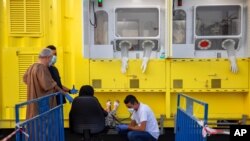The U.N.’s top diplomat for the Middle East peace process warned Tuesday that a breakdown in cooperation between Israeli and Palestinian leadership over annexation threats is hampering the COVID-19 response.
“Regrettably, the situation on the ground is rapidly being affected by the dramatic increase in COVID-19 cases in the West Bank, including East Jerusalem, and in Israel,” envoy Nickolay Mladenov told the U.N. Security Council in a virtual meeting.
Israel has recorded more than 52,600 confirmed coronavirus cases and 422 deaths, while the Palestinian Authority (PA) has confirmed over 9,200 cases and 64 fatalities.
“I am also concerned that we are far below the level of coordination that existed in the beginning of the year, when the first wave of the virus hit,” Mladenov said. “This situation could have serious repercussions on the ability to control its spread and its impact on people’s lives.”
Annexation plans
The two sides have seen tensions rise as Israel’s coalition government, led by Prime Minister Benjamin Netanyahu, announced in May that it plans to annex about 30% of the West Bank, including Israeli settlements and areas populated mainly by Palestinians.
To contain the pandemic, Mladenov said the Palestinian Authority has taken steps to limit movements across the West Bank and other affected areas. Israel has also reimposed limitations on gatherings and some nonessential businesses, and implemented lockdowns in specific areas. Movement between Israel and the Palestinian territories remains heavily restricted, and the Rafah border crossing between the Gaza Strip and Egypt has been closed since mid-May.
Financial crisis
The U.N. envoy said the situation has been made more challenging by the Palestinian Authority’s refusal to accept any of the taxes Israel collects at commercial crossings on behalf of the PA, worsening its already dire financial crisis and hampering its ability to deliver services.
“It has effectively blocked the ability of patients to travel from Gaza for treatment outside of the Strip and has led to delays in delivering humanitarian assistance and materials intended for the COVID-19 response and other health support and services,” Mladenov said.
He said the U.N. has concluded agreements with the PA so humanitarian assistance can continue unimpeded, including facilitating the transfer of patients from Gaza, and with Israel to simplify administrative procedures. But he cautioned that there are limitations to what the U.N. and other organizations can be expected to do.





